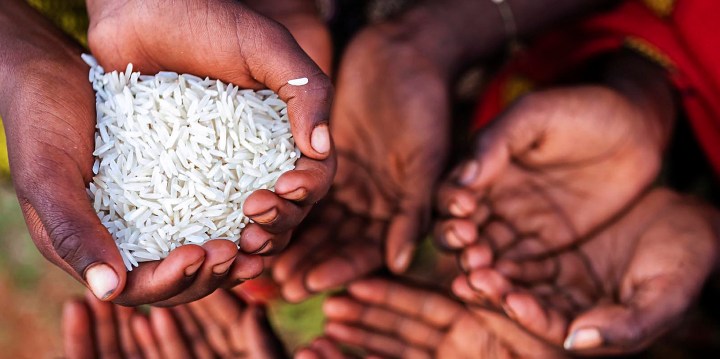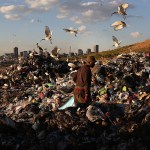
Maverick Citizen: Tuesday Editorial
It is immoral to make people beg for their right to food

There is something very undignified and dehumanising about having to weigh and make the case for people’s right to sufficient food because it assumes that this is not a basic right, or in essence a right to live.
This is why food insecurity has often been at the centre of conflict as people fight to survive.
Section 27 (1) (b) of our Constitution states: “Everyone has the right to have access to: sufficient food and water… ” and Section 28 (1) (c) gives an unqualified right to food for children when it notes: “Every child has the right to basic nutrition… ” However, there is scant evidence of the spirit of this as millions of South Africans face hunger and malnutrition every day.
Last week, the world’s leaders gathered at the United Nations Food Systems Summit . Ostensibly the purpose was to discuss how to tackle the startling figure of between 720 and 811 million facing hunger globally, which reflects an increase of 9,9% from 2020. In South Africa more than 40% of people are classified as food insecure.
Of course there are a variety of serious factors that contribute to this, including the onset of the Covid-19 pandemic and the impact of global heating on agricultural production and migration. But perhaps the more morally abhorrent one is the pursuit of corporate profits over people’s need to have access to food in order to thrive and develop.
This is why an alternative Global People’s Summit on Food Systems was set up by global civil society activists in protest. It took place at the same time, aiming to bring attention to the fact that transnational food corporations were taking over food systems, squeezing out local farmers and destroying the environment.
What the activists sought to promote and publicise was the possibility of a global food system that was human rights-centred as opposed to profit-driven.
Research by the Human Sciences Research Council has shown that big food corporations are either producing “healthy food” that is priced too high for the average person or cheap food that is ultra-processed and causing what is commonly referred to as a “double burden” of malnutrition and non-communicable diseases like diabetes, hypertension and obesity.
Healthy food was found to cost an unaffordable 69% more than non-healthy food options.
These non-communicable diseases not only endanger people’s health and even lives – as we have seen with the comorbidities that present a higher risk of death due to Covid-19 – but also place a strain on an already overstretched health system.
Some of the answers lie in our own hands, literally. That is if the government was prepared to support reforms to the food system.
In our own backyard, Djo BaNkuna, an ordinary citizen from Theresapark in Tshwane, faces a R1,500 fine for growing a cabbage patch on the pavement outside his house and selling them for R10 a head. The metro said he was infringing on municipal by-laws that stated that he was not allowed to obstruct others’ use of the pavement.
In explaining his decision to plant the food garden, BaNkuna said: “The reason I established that vegetable patch in 2019 was to meet some of our immediate needs, but also save a bit of money from my side because vegetables are really expensive. Also, my wife is a social worker in Soshanguve… she meets all sorts of people with different problems and hunger is among these, so the vegetable garden comes in handy.”
What does it say about our society when a man is criminalised for planting a vegetable garden in order to survive in a country where hunger and malnutrition are rife? The fact that BaNkuna has amassed such support, with other people coming out with their own stories about having planted their own pavement vegetable gardens to promote communal survival and solidarity in the face of unaffordable and ever-increasing food prices, should be something that we all rally around as South Africans.
In this regard, the ANC’s announcement that “we will ensure unrestricted development of urban and pavement gardens where crops can be planted to increase food security” must be welcomed. We’ll have to see if other political parties follow this approach.
All good people should also call for the immediate dropping of charges against BaNkuna.
However, what this also shows is the injustice of our current food system – one that forces people to make decisions affecting their health and abilities based on how much money they have in their pockets, and not what is deemed nutritionally sufficient for a healthy life.
Speaking at the UN Food Systems Summit, S’bu Zikode, leader of civil society organisation Abahlali baseMjondolo, which represents shack dwellers, said:
“We also know that when people receive their grants they mostly go straight to the supermarkets to buy food. The supermarkets suck money out of poor communities and make the rich even richer. It was recently reported that the largest shareholder in Shoprite will receive a payment of R342-million. This is completely immoral, especially in a country with mass unemployment, mass impoverishment and mass starvation.
“The food riots sent a clear message to the government and corporates that as long as people live in poverty there can never be peace and stability. Today the UN and corporations should draw an important lesson on the recent development in South Africa. Without justice there will be no peace.”
So, how then can our government and business live with this on their conscience: that the longer we live in a food security crisis, the more likely we are to descend into worse violent conflict than what we lived through in July?
It is morally repugnant and unlawful that so many people in South Africa should be hungry, especially children. The government should take our hard-won Constitution seriously and develop practical strategies to ensure “sufficient food” for everyone. This means regulating critical things like profiteering on essential foods, subsidising local agriculture and improving food literacy. World Food Day is on 16 October and would be a good time to see decisive action from the country’s leaders on their commitment to food justice. DM/MC
Maverick Citizen will publish a special newsletter on World Food Day, spotlighting the importance of sustainable, healthy and people-centred food systems that put the wellbeing of people ahead of callous profiteering. You can subscribe to the newsletter here.















 Become an Insider
Become an Insider
Yes this is true…no one should have to beg for food. Please tell that to the ANC who facilitated the theft of R1.3 trillion from taxpayers over the last Decade. This tax payers money ( mostly paid by 5.8% minority) could have been used to house, feed and educate the previously disadvantaged instead of wasting it on Gucci bags, Ferrari’s and the latest cell phones and hair extensions by the politically connected few. Shame on you.